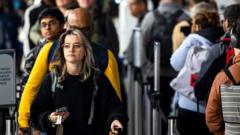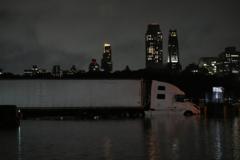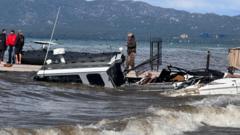Major flight delays reported as millions prepare for Thanksgiving journeys.
Arctic Weather Disrupts Thanksgiving Travel Across the US

Arctic Weather Disrupts Thanksgiving Travel Across the US
Severe winter conditions raise concerns for holiday travelers and airports.
As Thanksgiving approaches, a powerful Arctic blast is set to grip large portions of the United States, coinciding with one of the busiest travel periods of the year. The National Weather Service (NWS) has issued warnings of "dangerously cold wind chills" particularly affecting the northern Plains on Thursday. In addition, heavy snowfall is predicted for regions in the Northeast, including parts of New England, while thunderstorms are expected to sweep across the East Coast.
Weather forecaster Elizabeth Rizzini from BBC has highlighted that significant snow accumulation may impact states such as Maine and New York, as well as the northern Appalachian areas. Thunderstorm warnings are in effect for Southern states including Georgia, North and South Carolina.
Storm conditions are anticipated to move towards the Midwest by Friday, bringing lake-effect snow and severe thunderstorms. This phenomenon occurs when cold air travels over warmer, unfrozen water, causing precipitation in the form of snow. According to NWS, some areas might receive up to 8 inches (20 cm) of snow due to these conditions.
As holiday travelers navigate through these severe weather systems, airports are already experiencing significant disruptions. FlightAware reported over 4,500 delays and more than 60 cancellations on Wednesday alone. With Thanksgiving travel volumes surpassing previous records, the Transportation Security Administration (TSA) estimates that nearly nine million passengers will be screened at airports during the busiest days, Tuesday and Wednesday of this week leading up to the holiday.
This year's travel surge is largely attributed to lower gas prices, with nearly 80 million Americans expected to venture at least 50 miles (80 km) by road according to an analysis by AAA.
On the West Coast, residents face their own challenges as dense fog warnings are issued for parts of California and the Pacific Northwest, alongside freezing fog advisories in Oregon and Washington state. Recently, central California endured impacts from an "atmospheric river," which brings about heavy moisture from the ocean, while communities in the Pacific Northwest are still recovering from a recent bomb cyclone that led to flooding and power outages.
As Americans prepare for their Thanksgiving celebrations, the converging weather systems create an unpredictable environment for those traveling during this festive season.
Weather forecaster Elizabeth Rizzini from BBC has highlighted that significant snow accumulation may impact states such as Maine and New York, as well as the northern Appalachian areas. Thunderstorm warnings are in effect for Southern states including Georgia, North and South Carolina.
Storm conditions are anticipated to move towards the Midwest by Friday, bringing lake-effect snow and severe thunderstorms. This phenomenon occurs when cold air travels over warmer, unfrozen water, causing precipitation in the form of snow. According to NWS, some areas might receive up to 8 inches (20 cm) of snow due to these conditions.
As holiday travelers navigate through these severe weather systems, airports are already experiencing significant disruptions. FlightAware reported over 4,500 delays and more than 60 cancellations on Wednesday alone. With Thanksgiving travel volumes surpassing previous records, the Transportation Security Administration (TSA) estimates that nearly nine million passengers will be screened at airports during the busiest days, Tuesday and Wednesday of this week leading up to the holiday.
This year's travel surge is largely attributed to lower gas prices, with nearly 80 million Americans expected to venture at least 50 miles (80 km) by road according to an analysis by AAA.
On the West Coast, residents face their own challenges as dense fog warnings are issued for parts of California and the Pacific Northwest, alongside freezing fog advisories in Oregon and Washington state. Recently, central California endured impacts from an "atmospheric river," which brings about heavy moisture from the ocean, while communities in the Pacific Northwest are still recovering from a recent bomb cyclone that led to flooding and power outages.
As Americans prepare for their Thanksgiving celebrations, the converging weather systems create an unpredictable environment for those traveling during this festive season.




















